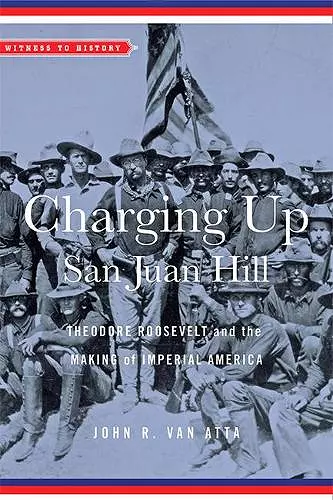Charging Up San Juan Hill
Theodore Roosevelt and the Making of Imperial America
Format:Paperback
Publisher:Johns Hopkins University Press
Published:14th Aug '18
Currently unavailable, and unfortunately no date known when it will be back
This paperback is available in another edition too:
- Hardback£43.00(9781421425863)

How Theodore Roosevelt and his Rough Riders exemplified “manhood” and civic virtue.
Below a Cuban sun so hot it stung their eyes, American troops hunkered low at the base of Kettle Hill. Spanish bullets zipped overhead, while enemy artillery shells landed all around them. Driving Spanish forces from the high ground would mean gaining control of Santiago, Cuba, and, soon enough, American victory in the Spanish-American War. No one doubted that enemy fire would claim a heavy toll, but these unusual citizen-soldiers and their unlikely commander—39-year-old Colonel Theodore Roosevelt—had volunteered for exactly this kind of mission.
In Charging Up San Juan Hill, John R. Van Atta recounts that fateful day in 1898. Describing the battle’s background and its ramifications for Roosevelt, both personal and political, Van Atta explains how Roosevelt’s wartime experience prompted him to champion American involvement in world affairs. Tracking Roosevelt’s rise to the presidency, this book argues that the global expansion of American influence—indeed, the building of an empire outward from a strengthened core of shared values at home—connected to the broader question of cultural sustainability as much as it did to the increasing of trade, political power, and military might.
At the turn of the twentieth century, Theodore Roosevelt personified American confidence. A New York City native and recovered asthmatic who spent his twenties in the wilds of the Dakota Territory, Roosevelt leapt into the war with Spain with gusto. He organized a band of cavalry volunteers he called the Rough Riders and, on July 1, 1898, took part in their charge up a Cuban hill the newspapers called San Juan, launching him to national prominence. Without San Juan, Van Atta argues, Roosevelt—whom the papers credited for the victory and lauded as a paragon of manhood—would never have reached a position to become president.
Van Atta adeptly links Roosevelt's deep immersion in Western American culture to his investment in American imperialism in a readable cultural and military history. Van Atta's efforts to shine a light on the stories Roosevelt failed to tell about the Spanish-American War make the monograph particularly valuable and give a sense that this is not merely another laudatory biography of T.R. Charging Up San Juan Hill's greatest strength is its innovative thinking about old questions of empire . . . [it] would work well in undergraduate courses on American military history or the Gilded Age and Progressive Era . . . The text should prove a worthy addition to the shelves of Western historians.
—Cecily N. Zander, Pennsylvania State University, Western Historical Quarterly
The strength of Van Atta's work is its brisk and engrossing narrative of the causes of the Spanish-American War; of the formation, actions, and meaning of the Rough Riders; and of the political benefits that Colonel Roosevelt reaped from serving . . . This approachable work will be well received in an undergraduate course as an engaging introduction to the cultural factors of the Spanish-American War and how masculine regeneration and American imperialism intersected.
—Kyle Anthony, University of Saint Mary, Journal of American History
ISBN: 9781421425870
Dimensions: 229mm x 152mm x 14mm
Weight: 318g
224 pages